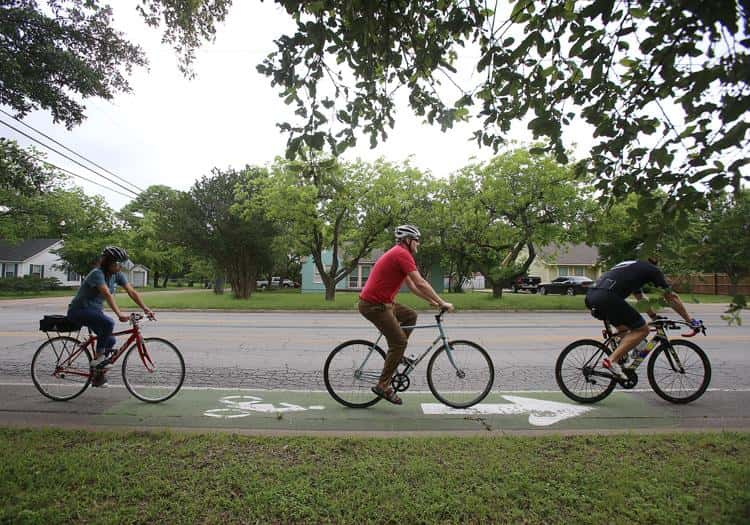
Waco’s economy cratered in April, but beer and bicycles sold like hotcakes.
COVID-19 did a number on jobs, hotel stays, retail sales and vehicle purchases, causing the Greater Waco Economic Index to drop 2.8 points in raw scoring, the largest monthly decline since Amarillo-based economist Karr Ingham began tracking local trends using data dating to 2000.
The final score stood at 131.5, down from 134.3 in March.
“The employment loss and unemployment rate increase in April is simply staggering,” Ingham said. “An estimated 12,300 jobs were lost from March to April … reflecting the elimination, either permanent or temporary, of nearly 10% of all jobs in the metro area in just one month with more to come.”
The First National Bank of Central Texas and the Tribune-Herald sponsor Ingham’s work in preparing a monthly examination. Several invited business owners discussed April’s GWEI presentation remotely via Zoom.
Ross Harris, who owns The Bear Mountain at 4425 W. Waco Drive, said COVID-19 literally forced him to close half his operation, the outdoors equipment part in which customers could buy hiking gear, kayaks and ski equipment. His bike shop, conversely, was deemed an essential business. A weeklong lull immediately following shelter-in-place orders gave way to bedlam.
“Right around then, I guess, collective cabin fever struck,” Harris said. “There wasn’t a whole lot to do other than get outside — in the neighborhood, on Waco’s outskirts or on the Cameron Park trail system. We were inundated with people looking to purchase bikes for transportation or recreation, and by those wanting to repair bikes stored away for years.”
Harris’ inventory includes bikes priced at $400 and well above. But the shortage of bicycles to choose from has struck big-box retailers as well, he said. He mentioned reports that retailers nationwide are scrambling for two-wheelers while manufacturers struggle to meet demand.
“One side of my business functionally shut down, while the other enjoyed sales that quite honestly were through the roof,” Harris said. “We were busier than we could imagine, and it is continuing. The coronavirus afforded time, wanted or not, to spend time with families and be active. The response has been heartening, a rekindled interest and love for cycling.”
Customers hunkering down during COVID-19 also have taken a shine to beer, said David Floyd, general manager of Glazer’s Wholesale Distributors. Sales of multi-packs in grocery and convenience stores have offset the loss of sales to shuttered restaurants and bars, Floyd said in a phone interview.
“For whatever reason, we’ve had a good three months, and we’re appreciative of it,” he said.
He said traditional labels such as Budweiser and Miller have made a comeback and suggested beer fans may crave a return to normalcy.
Beer and bicycles aside, the GWEI offered little good news.
Jobs were lost across the board in Waco, but leisure and hospitality took the biggest hit. An estimated 7,700 people worked in lodging, dining or tourism-related fields locally in April, 40% fewer than in April last year.
That was the highest percentage decline in any category.
Struggling to attract travelers during the COVID-19 pandemic, and with high-profile properties including the Waco Hilton and Courtyard by Marriott temporarily closing, hotels locally generated only $3.1 million in revenue in April, a drop of more than half from the $7 million a year ago.
Employment declined 38% just between March and April, Ingham reported.
Other heavy losses were suffered in the categories of education and health services, manufacturing, and trade-transportaton-utilities, according to the report.
The jobless rate of 10.6% rose from 4.9% in March and 2.8% a year ago.
“On the heels of record automobile sales activity in the first quarter, auto sales activity fell dramatically in April, with inflation-adjusted spending on new and used motor vehicles down by over 28% for the month compared to April a year ago,” Ingham reported. “That pulled the year-to-date total negative as well, down by 2.4% compared to the January-April 2019 total.”
Housing stumbled but remains the silver lining in April’s cloud.
The city of Waco issued 48 permits in April to build new homes, a 27% decline year-over-year. But for perspective consider only 17 permits were issued to build new homes in April 2000, Ingham’s base year.
A total of 232 existing homes changed hands in April, down from 275 a year earlier. But the Waco Multiple Listing Service used as a source by Ingham reveals 878 homes were sold January through April, only a fractional drop from the 881 sold during the first four months of last year.
Kevin Vander Woude, a residential specialist with Turner Behringer Real Estate, said he senses the tide is turning for the better.
“Listings in April were down 25% from last year. In May they were down 4%. Deals are being made, and plenty of homes are under contract,” Vander Woude said. “Price points are as high as they’ve ever been: $113 per square foot, which is $6 more per square foot than the previous year.”
He said Waco continues to suffer a shortage of inventory.
Ingham reported $223,589 was the average April sales price for a home locally, up almost 8% from the same month last year.
American Guaranty Title CEO Chuck Sivess said restrictions on human contact fortunately have been relaxed, and real estate agents again can join their clients in signing the necessary paperwork to close deals.
He said American Guaranty Title had offered curbside closings.
Retail spending declined a modest 4.4% in April, but that number is misleading, in that April totals reflect February sales reported to the Texas Comptroller’s Office in March, Ingham reported. Spending officially reported through April actually exceeds that through April last year by 3%.
Ingham said Waco is suffering along with the rest of the state and nation.
“At least somewhat encouragingly, ‘peak shutdown’ has probably come and gone with the managed reopening of the economy, leading to improving levels of economic activity,” Ingham concluded. “However, the worst of the economic fallout is probably yet to come … and economic numbers are likely to get worse before they get better.”
—WACOTRIB
